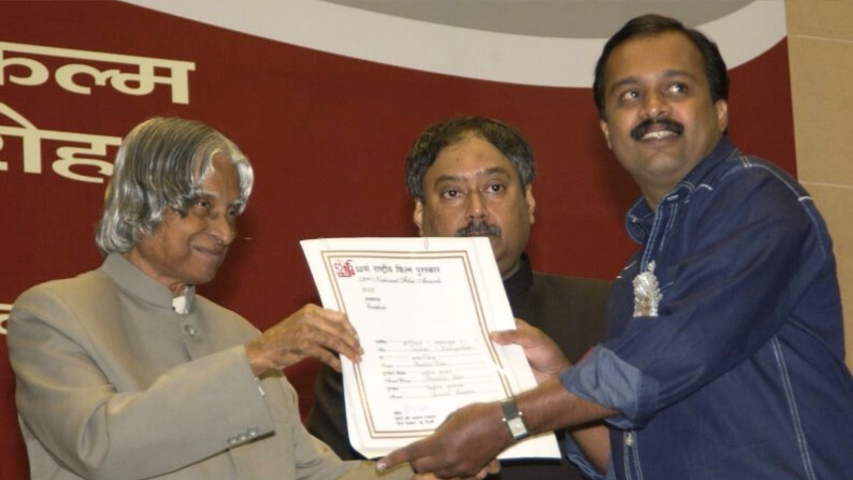
RETROSPECTIVE: “ORIDAM” @20 IS A PORTRAIT OF PAIN
by Utpal Datta February 26 2025, 12:00 am Estimated Reading Time: 4 mins, 26 secsA poignant exploration of a sex worker’s struggles, Pradeep Nair’s Oridam challenges conventional portrayals of female sexuality, offering a visually compelling, emotionally resonant narrative that transcends time and societal prejudices. Utpal Datta revisits the film…
Oridam, directed by Pradeep Nair, is a powerful Malayalam film that explores the harsh realities of sex work without resorting to sensationalism. Featuring a stellar performance by Geetu Mohandas, the film touches themes of survival and exploitation through poetic cinematography and restrained storytelling. Unlike many mainstream films, Oridam avoids provocative imagery, instead focusing on the protagonist’s emotional turmoil. Awarded the National Film Award and multiple Kerala State Film Awards, this critically acclaimed drama remains relevant today, offering a thought-provoking commentary on societal norms and the struggles of marginalized women.

Sexuality and Social Commentary in Indian Cinema
The portrayal of sexuality, prostitution, and various social perspectives in Indian cinema is nothing new. Many Hindi films, created with commercial interests in mind, have embraced the use of sexuality—particularly female sexuality—as a formula. In recent years, some films, especially in regional languages, have incorporated provocative images and scenes of the female body under the guise of narrative necessity. Even if such scenes do not enhance the film’s core message, they add an element of excitement for the audience, sometimes even igniting controversy. Against this backdrop, Pradeep Nair’s film Oridam stands out as a remarkable exception.
Pradeep Nair’s Malayalam film Oridam focuses on the life, struggles, and dreams of a sex worker. The protagonist, an orphaned young woman, survives as a sex worker and shares her joys and sorrows with another sex worker. She also has a child, whom she keeps in an orphanage. Desperate to leave her life behind, she seeks work elsewhere, but after failing to find employment, she approaches an NGO that supports sex workers. However, the organization only brings her in front of television cameras to share her tragic story but cannot offer her a job. Ultimately, she hands over all her savings and jewelry to a broker in hopes of securing a job opportunity in the Middle East. Meanwhile, she is assaulted and humiliated by a client. The broker, who promised to help her travel abroad, is arrested by the police, closing all doors of opportunity for her. The very profession she wished to escape now becomes her inevitable reality again. Soon, the dead body of her companion is found on the roadside. In the end, she takes her child from the orphanage and embarks on a new journey in search of a better life.
Aesthetic Restraint and Visual Storytelling
The way this concise story is told through the camera highlights the director’s control over the narrative. Remarkably, despite the subject matter, the film avoids obscene dialogue and provocative scenes. The director had ample opportunity to showcase the female body or intimate moments, yet he chose not to. Instead, his focus remains solely on capturing the protagonist's pain and suffering.
The film has minimal dialogue, relying on visual storytelling to convey its message. The director’s skill is evident in how he portrays the protagonist’s loneliness amidst the bustling city. The cinematography effectively conveys this feeling—sometimes showing her surroundings blurred and out of focus, representing the uncertainty and hopelessness she faces, while moments of clarity highlight the rare glimpses of possibility. The contrast between the city’s bright neon signs, the glowing advertisements, and the bleak, painful reality of the protagonist waiting for clients creates a striking emotional tension. The dimly lit encounters with customers, the illusion of hope sparked by dazzling billboards, and the brutal reality of her existence all contribute to the film’s poignant and layered storytelling.
The camera movements in the film are slow and deliberate, yet each shot is filled with emotion. Cinematographer Manoj Mundayat masterfully employs light, shadows, and color to create poetic and haunting visuals. The film's philosophical undertones are beautifully conveyed through the cinematography. Editor Ranjan Abraham skillfully sustains the rhythm of the narrative, particularly in the emotional scenes, ensuring that each shot is impactful. The background score by Issac Thomas Kottukapilly adds another layer of depth to the film’s atmosphere.
Geetu Mohandas delivers an outstanding performance as the protagonist. Through her body language and expressions, she exhibits remarkable sensitivity in conveying the character’s pain, aspirations, and despair. Her struggle between outwardly inviting clients while internally grappling with anguish is portrayed with exceptional nuance. The performances of the supporting characters also effectively complement the film’s central theme.
Oridam is a successful cinematic portrayal of a woman’s pain. However, the film could have gained even more impact had it presented a broader perspective on the protagonist’s environment and the societal structures surrounding her.
Director Pradeep Nair received the National Film Award (Special Jury Award) for this film. It also won several Kerala State Film Awards, including Best Director (Special Jury), Best Actress, Best Music, Best Costume Design, and Best Processing.
The film’s strongest aspect is the director’s masterful restraint in storytelling. This is exactly why Oridam continues to hold its timeless emotional resonance, even two decades later, in a world of shifting values and sensitivities.





-173X130.jpg)
-173X130.jpg)
-173X130.jpg)

-173X130.jpg)
-173X130.jpg)
-173X130.jpg)
-173X130.jpg)